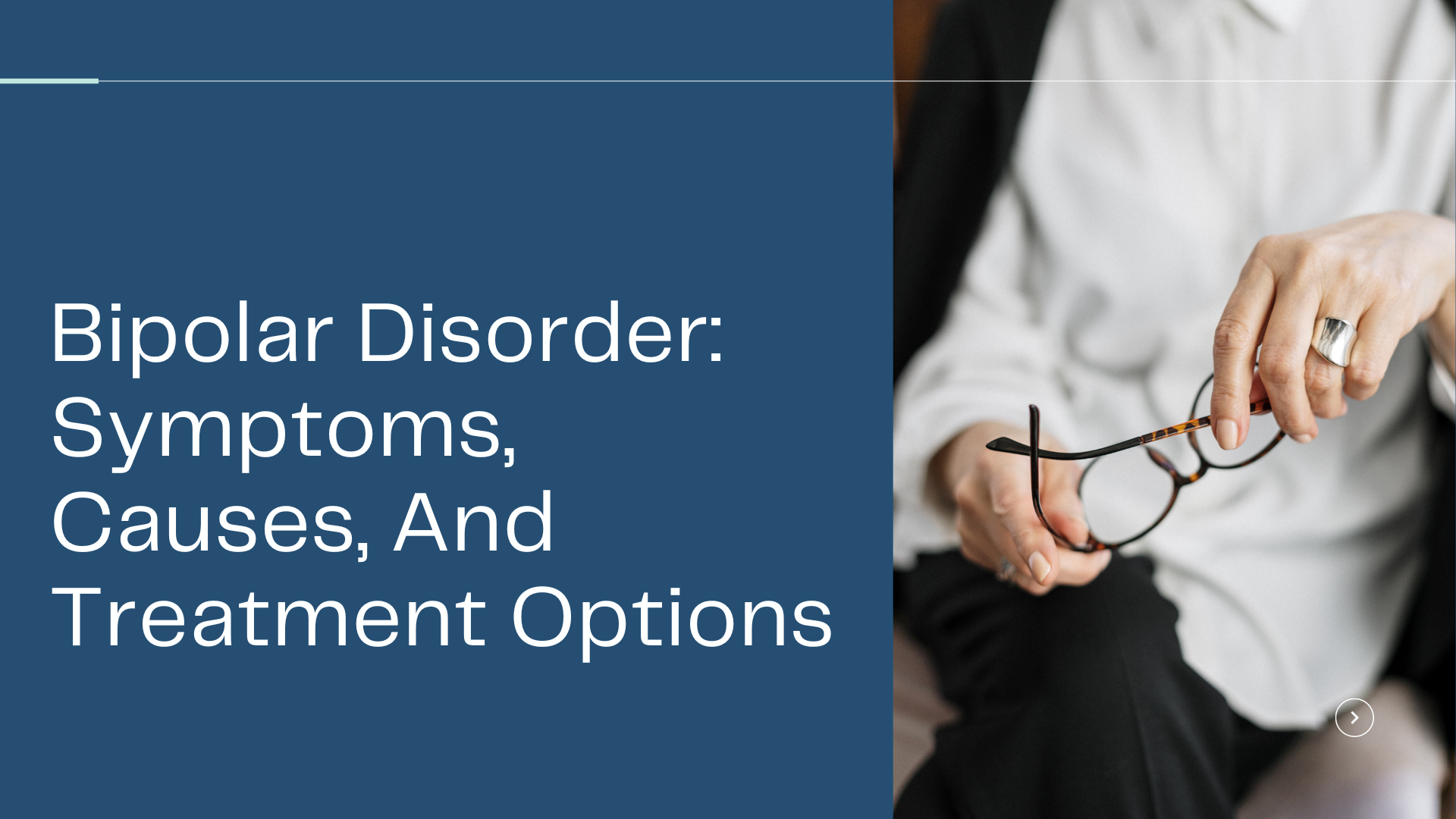Bipolar Disorder: Symptoms, Causes, And Treatment Options

What is Bipolar Disorder?
Bipolar disorder is a mental health condition characterized by extreme mood swings or episodes of mania and depression. Mania is characterized by symptoms such as high energy, excessive happiness, and little need for sleep, while depression is characterized by feelings of sadness, hopelessness, and a lack of energy. These episodes can last for days, weeks, or months and can disrupt a person’s daily life. Bipolar clutter is as a rule treated with a combination of pharmaceuticals and therapy.
Overview:
Bipolar disorder is a serious mental health condition that affects millions of people worldwide. It is characterized by extreme mood swings, known as manic and depressive episodes, which can last for days, weeks, or even months at a time. The manic episodes are characterized by high energy and impulsivity, while the depressive episodes are characterized by low energy and feelings of sadness and hopelessness. Bipolar disorder is a chronic condition that requires ongoing management, and it can be debilitating if left untreated.
There are several different types of bipolar disorder, including:
- Bipolar I disorder: This type of bipolar disorder is characterized by manic or mixed episodes (manic symptoms and symptoms of depression at the same time) that last for at least 7 days, or manic symptoms that are severe enough to require hospitalization.
- Bipolar II disorder: This type of bipolar disorder is characterized by a pattern of depressive episodes alternating with hypomanic episodes (a milder form of mania).
- Cyclothymic disorder: This type of bipolar disorder is characterized by a pattern of hypomanic symptoms alternating with mild depression for at least 2 years.
- Other specified and unspecified bipolar and related disorders: This category includes cases where the symptoms of bipolar disorder are present but do not meet the criteria for any of the above types.
Causes & Risk Factors:
- Genetics: Studies have shown that bipolar disorder tends to run in families, suggesting that there is a genetic component to the disorder.
- Brain Structure and Function: Research has found that certain areas of the brain are affected in individuals with bipolar disorder, including the prefrontal cortex, the amygdala, and the hippocampus.
- Environmental Factors: Trauma, stress, and other environmental factors can trigger the onset of bipolar disorder or exacerbate symptoms.
- Hormonal Imbalances: Hormonal imbalances, such as fluctuations in thyroid hormones or cortisol levels, can contribute to the development of bipolar disorder.
- Substance Abuse: Substance abuse, particularly alcohol and drug use, can increase the risk of developing bipolar disorder or worsening symptoms.
- Medical Conditions: Certain medical conditions, such as thyroid disorders or brain injuries, can increase the likelihood of developing bipolar disorder.
- Other Psychological Disorders: Individuals with other psychological disorders, such as anxiety or PTSD, may be at a higher risk of developing bipolar disorder.
Risk factors:
- Family history of bipolar disorder
- Previous or current depression or other mood disorders
- Substance use disorders
- Chronic medical conditions
- Trauma or abuse
- Stressful life events
- High level of creativity or artistic talent
Symptoms
- Mania or hypomania (elevated or irritable mood, increased energy, and activity levels, decreased need for sleep, excessive talkativeness, racing thoughts, impulsive or reckless behavior)
- Depression (sadness, loss of interest or pleasure in activities, decreased energy and activity levels, difficulty concentrating, changes in appetite and sleep patterns, feelings of worthlessness or guilt)
- Mood swings (rapid shifts between manic or hypomanic episodes and depressive episodes)
- Psychotic symptoms (such as hallucinations or delusions) during manic or depressive episodes
- Difficulty functioning in daily life (such as problems at work or school, difficulty maintaining relationships)
- Suicidal thoughts or behavior.
Treatments for Bipolar Disorder
- Medications: Antidepressants, mood stabilizers, and atypical antipsychotics are commonly used to treat bipolar disorder.
- Psychotherapy: Cognitive Behavioral Therapy (CBT), Interpersonal and Social Rhythm Therapy (IPSRT), and Family-Focused Therapy (FFT) are some of the psychotherapeutic approaches used to treat bipolar disorder.
- Electroconvulsive therapy (ECT): This is a medical procedure that is used to treat severe cases of bipolar disorder that do not respond to other treatments.
- Lifestyle changes: Regular exercise, healthy eating, and getting enough sleep can help manage symptoms of bipolar disorder.
- Support groups: Joining a support group can provide a sense of community, understanding, and validation for people with bipolar disorder.
- Complementary therapies: Some people find relief from symptoms through alternative therapies such as acupuncture, yoga, or meditation.
- Hospitalization: In severe cases, hospitalization may be necessary to provide intensive treatment and stabilization.
In conclusion, at Careme Health, we understand that every individual’s experience with Bipolar Disorder is unique. That’s why we provide customized treatment plans, tailored to each patient’s specific needs and goals. Our team of experts uses a combination of evidence-based therapies and medications to deliver affordable and proven results in the treatment of Bipolar Disorder. We believe that everyone should have access to the mental health care they need, and we strive to make our services as accessible and affordable as possible. Whether you are struggling with mild or severe Bipolar Disorder, we are here to help you find the support and resources you need to manage your symptoms and improve your overall well-being.
Related Articles

Letting Go With Grace: Emotional Tools for Closure
Letting go is never easy. Whether we are parting ways with a loved one, ending a relationship, leaving a job, or saying goodbye to a cherished chapter of life, the emotional weight can feel overwhelming. Yet, closure is essential for our emotional well-being. Without it, we carry unresolved grief, anger, regret, or longing that can seep into new relationships and experiences, holding us back from healing and growth.

Breakup Blues: How to Cope and Rebuild Your Self-Worth
A breakup often feels like a silent earthquake—unseen by others but devastating within. The pain doesn’t just come from the loss of a relationship, but from the crumbling of the life, identity, and future you built with another person. You may find yourself questioning your worth, doubting your value, and feeling isolated even when surrounded by people. In Indian society, where emotional expression is often discouraged and breakups can be stigmatized, this pain may feel even more overwhelming. But the truth is—while breakups may shake you, they do not define you. You are not broken; you are in a process of emotional reformation. And with the right tools, guidance, and support system, you can rebuild not just your self-worth but also your entire life narrative.

Healing After Heartbreak: A Mental Health Perspective
Heartbreak doesn't just break your heart—it can shatter your sense of identity, peace, and purpose. Whether the end was expected or abrupt, mutual or one-sided, short-lived or long-term, the aftermath often leaves people emotionally disoriented. In Indian culture, where societal expectations and family involvement in romantic relationships are prevalent, the pain is not just personal—it is public. Yet, very few are taught how to heal from emotional loss in a healthy, sustainable way.

Boundaries in Love: Saying ‘No’ Without Guilt
Love, in its truest form, should be a safe space—a space where individuality is not only respected but celebrated. Yet, in many relationships, especially in the Indian cultural context, love is often misunderstood as constant availability, complete sacrifice, and putting the other person first, always. As noble as this may sound, this version of love often leads to emotional exhaustion, suppressed resentment, and the erosion of one’s identity.

Gaslighting in Relationships: What It Is and How to Heal
Gaslighting is a form of emotional abuse that erodes your ability to trust your own perception. It’s a slow, insidious process that often begins with subtle doubts and ends with complete self-questioning. In romantic relationships—especially in the Indian context where silence, compromise, and duty are often mistaken for love—gaslighting can be even harder to recognize.

How Depression Can Affect Your Relationship—And What You Can Do
Depression is not just an internal struggle—it ripples outward, affecting relationships, routines, and the emotional fabric that holds people together. When someone is dealing with depression, it's not only their world that becomes dim—it can cast a shadow over their most intimate connections too. In a country like India, where open conversations about mental health are still rare and love is often equated with endurance, depression within a relationship can become invisible, misunderstood, or misjudged.
